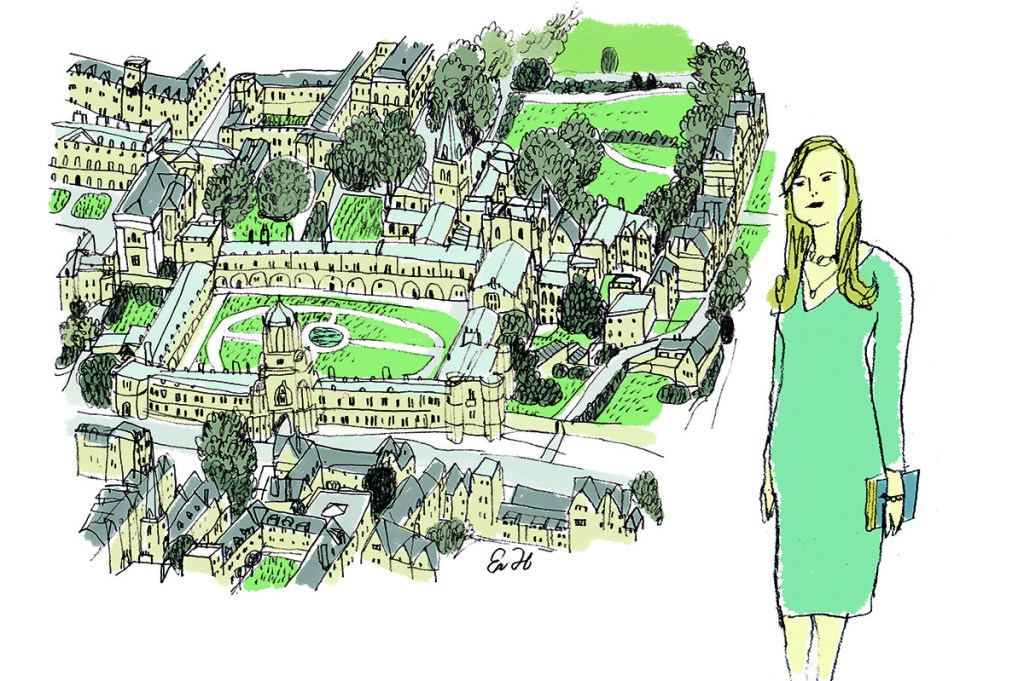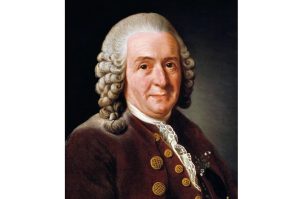“Oxford I do not enjoy,” wrote T.S. Eliot to Conrad Aiken in February 1915. “The food and the climate are execrable, I suffer indigestion, constipation, and colds constantly.” The poet was clearly having one of his bad days. Since arriving at the university the previous October, he had found himself in and out of love with the place, which was hardly surprising, given the timing.
Most of the undergraduates at Oxford had either left or were on the verge of leaving to fight for their country, meaning that the lecture and tutorial rooms were almost empty, the sports fields green through lack of use, and the centuries-old traditions stalling like motor cars on the long stretch of the High. The outbreak of the First World War left Eliot marooned in what one of his peers described as “no more than a shrunken skeleton of a university.”
Following his studies at Harvard, the twenty-six-year-old from St. Louis had come over on a traveling fellowship to complete his doctorate at Merton College. The fact that the Oxford professor whose work formed the basis of his research was unwell and unable to supervise his thesis could only have exacerbated Eliot’s growing feelings of isolation. Barred as an American from participating in the military-training exercises of his British contemporaries, the young poet resigned himself to gathering together enough of his fellow countrymen to fill a rowing boat and falling in with a literary society dominated by the myopic and medically exempt.
For Eliot, as for other Americans, wartime Oxford proved something of a culture shock. Any preconceived ideas they had of joining a thriving community of genteel English intellectuals for debate and croquet were swiftly dashed by international politics. As the war progressed, they typically found themselves alone with each other, the number of undergraduates enrolled at each of the colleges falling in many cases to fewer than eight. The “Oxford experience” was hardly that. Certainly Eliot wished that he had arrived sooner. The “boarding school discipline” that prevailed over the desolate halls was tolerable, but hardly desirable for a man seeking a career, a wife and a social life.
Researching my new book, Not Far from Brideshead: Oxford Between the Wars, I was struck by the fact that the university was so male-heavy in the first part of the twentieth century that many young men went through their entire degrees without meeting a single female student. It is little wonder that many of them took to escaping for London whenever they could. Only in 1920 were women deemed eligible to receive degrees as opposed to mere “certificates” upon completing their courses. Their increased visibility was accompanied by a rebirth of student life in which they were only partially integrated following the harrowing years of World War One.
The Oxford milieu of the Roaring Twenties will be familiar to readers of Brideshead Revisited. Evelyn Waugh based several of the characters in his novel on people he had known during his own highly raucous student days at Hertford College from 1922. Many of them have come to epitomize English eccentricity in that era. Maurice Bowra, a classics don known for his sharp wit and fondness for malice, inspired Mr. Samgrass, the rather treacly professor sent to supervise Sebastian Flyte. The aristocratic Alastair Graham, Waugh’s sometime lover, was the prime model for Sebastian. And then there was Harold Acton, a real-life Anthony Blanche, reciting T.S. Eliot’s poems from the windows of Christ Church in his silk stockings and bowler hat.
The leading aesthete of his day, Acton was born to a British father, Arthur Acton, an art dealer, and an American mother, Hortense Lenore Mitchell, daughter of the founder of Illinois Trust and Savings bank. While setting the trends for many of his British contemporaries in the 1920s, Acton was a thoroughly cosmopolitan figure whose experience of Italy in particular lent him a certain confidence as a tastemaker in an initially rather staid and gray England. The Englishness of Oxford’s aesthetes in their eye-catching clothes and eyebrow-raising antics is often remarked upon, but there was also an international flavor to their origins and the ambitions that accompanied them.
To many students studying in Oxford, the fashions of the Continent represented the height of sophistication, just as the United States seemed to be the gold mine of the world. More than a few Oxford men made financially expedient matches with American women. The Riga-born scholar Isaiah Berlin, a fellow of All Souls, Oxford, described the stereotype when he advised a friend to marry a “rich intelligent wonderfully good looking American” and to live with her in England. The glamorous allure of the United States versus the intellectual pull of quaint archaic Oxford is a dichotomy that has never gone away.
Many dons nevertheless hopped across the pond expecting to find something similar to Oxford in Massachusetts and New Jersey. The aforementioned Bowra was offered jobs at both Harvard and Princeton but was shocked by the differences in lifestyle. Going over to lecture in the mid-1930s, he admired the growing classics faculty at Harvard, which had until recently included a young Milman Parry, the great pioneer in Homeric studies, who tragically shot himself, but the atmosphere of the place was wholly unfamiliar. The food, Bowra complained, tasted of tins, and was eaten at the ludicrously early hour of 6 p.m. There was barely any alcohol to be had. His own dinners, by contrast, were famous in Oxford for their booziness and extravagance — to say nothing of the sparkling, invariably ribald conversation — and often went on in his own rooms well into the night.
Beyond such vexing problems, Bowra found the students at Harvard to be highly conscientious and eloquent, but stronger in conversation than in their written work. He observed that they were unused to producing two essays a week, which was (and remains) standard for their Oxford counterparts. Intriguingly, Eliot had noted the reverse, describing himself as “beginning my house at the roof” in his philosophical studies at Harvard while reverting to foundations after arriving in Oxford. It was not the case that one was better than the other, only that education in England and America were poles apart, not least in structure. The tutorial system, in which students were taught one-on-one or one-on-two, originated in the fourteenth century and was virtually unknown outside of Oxbridge.
At the outbreak of the Second World War, another Oxford-educated poet, W.H. Auden, went over to the States, where he also taught, first at a school and then at university level. His own experience was one of liberation. Whereas he had found Oxford rather stifling — he had spent much of his time there as a student writing poetry rather than completing his essays and went down with just a third-class degree — America seemed to offer him an appealingly clean slate. No one there made a pretense of trying to revive tradition, he said, which for a poet could be strangely refreshing.
The Oxford life certainly wasn’t for everyone, but for those Americans who did come over in the early twentieth century, it could be inspiring precisely because it defied expectation. Just as the British crossed the Atlantic and found themselves startled by the discipline and propriety, so Americans who entered Oxford in the Great War and its aftermath were justified in feeling bewildered by the silence followed by the sudden explosion of self-expression promoted by the likes of Harold Acton. Neither was quite what the other imagined it to be.
Ultimately, however, the welcoming of Americans to a new city — or indeed a very old one with its own traditions and way of life — was always going to revitalize the place and help shape its outlook. The denouement of the Second World War would ensure that the traffic continued in both directions, a Ford Super Deluxe speeding one set of youngsters along one way, and a wicker-basket-bearing bicycle carrying a begowned pair in the other.
Not Far From Brideshead: Oxford Between the Wars by Daisy Dunn is published in the UK by Weidenfeld & Nicolson. This article was originally published in The Spectator’s May 2022 World edition.


















